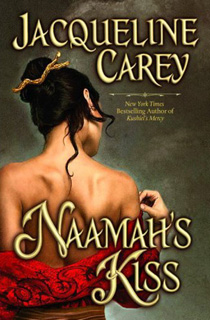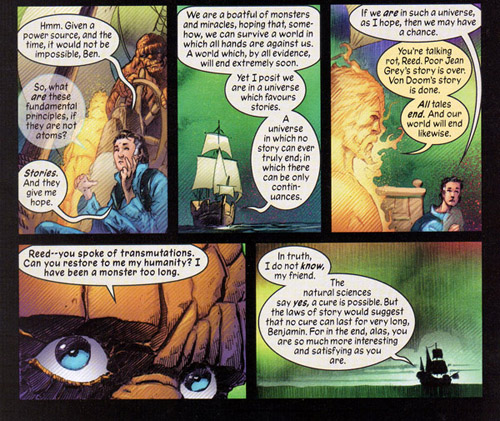Gods and Monsters
 Jacqueline Carey’s third Terre d’Ange trilogy, the Moirin books, seem to be in general better liked than the books about Imriel. I can’t agree with this opinion. It might be because I read them first, and therefore had gone pretty far into Naamah’s Kiss before I got a satisfactory translation of “diadh-anam“. From context, I was forced to conclude that “”diadh-anam” was Cruithne for “plot”. As in “Jehanne, I adore you, but I find that the plot is telling me I must go to China.”
Jacqueline Carey’s third Terre d’Ange trilogy, the Moirin books, seem to be in general better liked than the books about Imriel. I can’t agree with this opinion. It might be because I read them first, and therefore had gone pretty far into Naamah’s Kiss before I got a satisfactory translation of “diadh-anam“. From context, I was forced to conclude that “”diadh-anam” was Cruithne for “plot”. As in “Jehanne, I adore you, but I find that the plot is telling me I must go to China.”
Of course all the main characters in the Terre d’Ange books have been a singularly god-ridden bunch. However, Phèdre and Imriel and their cohorts had to deal more with powers and inclinations that they received from their gods in much the same way that other heroes have received them from radioactive spiders. The actions they take are to help friends, or make bargains with enemies, or act for their country, or earn a living, or do stupid things because of lust or youth or stupidity.
Moirin, on the other hand, has a goddess that micromanages her every action. Go to Terre d’Ange. Date a hot magician. Learn tai chi. Etc., etc. The Maghuin Dhonn winds up being a character as present in the book as poor, sexy, silly Moirin herself, only a lot less interesting. It’s the Q problem. How do you use a god among mortals as a character? Alan Moore did it with Dr. Manhattan, but that worked because he let us into Dr. Manhattan’s brain, showed us what the world looked like to him. But all you ever see of the Maghuin Dhonn is just her moving her favorite character around like a chess piece; and why would you ever want to read a book about the adventures of a chess piece, when you could read about the mind behind the chess game?
In truth this is a problem I have with a lot of fantasy books; Bujold’s Chalion books spring especially to mind. The gods are awake and moving around the world, and all we ever get to see are the chess pieces. It works in Lovecraftiana, because you get a sense of the hideous horror of life as a tiny, limited mind, controlled by powers you cannot possibly comprehend. Weirdly, Neil Gaiman gave us a bit of that as well in 1602:

If physics ran your life Ben, we could fix you; but because there’s a Creator, have no hope, because you’re just so much more satisfying this way.
I’d quite like to see fantasy books in which the power religion wields is like the one it wields in this world: a great and effective social power, but not one in which clerics actually receive powers or knowledge from the gods. The closest I’ve seen is Moonwoman’s worship in Suzy McKee Charnas’ Holdfast Chronicles, but then, that’s science fiction, not properly fantasy. I don’t find it in fantasy, and maybe this is due to the very nature of fantasy. Isn’t part of the nature of fantasy the dream of a shortcut? Power that comes to your hand for some memorized words and the wave of a wand, rather than because of generations of study and stringent experimentation and begging for funding and false steps and collaboration with mathematicians who don’t shower enough and political battles and eventually trying to deal with the environmental fallout?
[…] Black Gate Tags: Gods, Monsters […]